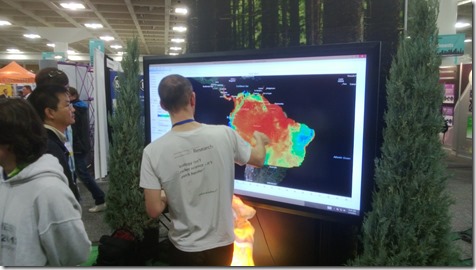AGU 2012–Environment and large displays are fun
This week many of us from the Microsoft Research Earth, Energy and Science team are down at AGU2012 enjoying all that the American Geophysical Union’s 45th annual Fall Meeting has. MSR has been a participant for many years and really enjoy connecting with scientists and researchers to discuss their scientific challenges.
In the Microsoft Research booth this year we have experts from many different areas available to talk about challenges with collecting, visualizing and managing data. We also have Windows 8 and Office 2013 running on the machines to show what is possible from Surface devices, Desktops, and really large touch screens like the 82'” one from Perceptive Pixel in the booth.
You think a tablet is a touch device? Just touch one of these and you’ll realize that pads are mini compared to the 82" ![]()
Also we are hosting the following FireSide Chats at the booth tomorrow – Wednesday.
Wednesday 10:00am -10:30 am
| Real-Time Water System Management | Prof Barbara Minsker & Jong Sung Lee |
| The goal of this project is developing a prototype near-real-time decision support system for river modeling and management in Texas that can serve as a national and international model to promote more sustainable and resilient water systems | |
| Wed 2:00 pm - 2:30 pm | |
| BING: An introduction to Microsoft’s Bing Maps Platform | Erik Lindeman & Ryan Eckardt |
| In this session Microsoft will provide an overview of the Bing Maps Platform, its features and how they can be used in a wide range of applications. | |
| Wednesday 3:30pm -4:00pm | |
| Gadgeteer | Steven Johnston |
| Microsoft .NET Gadgeteer is an open-source toolkit for building small electronic devices using the .NET Micro Framework and Visual Studio or Visual C# Express. | |
| Wednesday 5:00pm - 5:30pm | |
| DATA MANAGEMENT 101 | Carly Strasser |
| Tips and tools for managing your research data better |
Also glad to see the support for Windows Phone and all HTML apps via the link https://app.core-apps.com/agu-fm12 on that AGU program guide.
